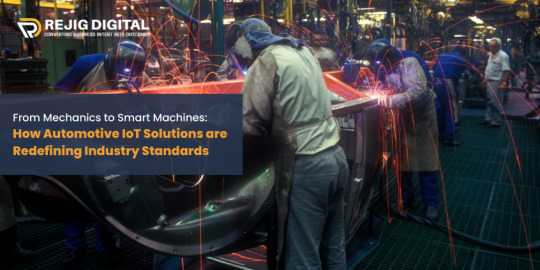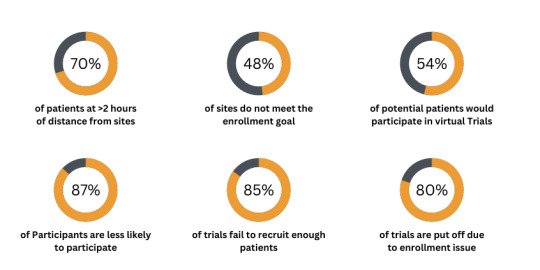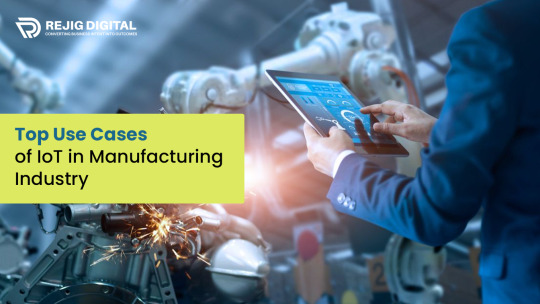Don't wanna be here? Send us removal request.
Text
0 notes
Text
1 note
·
View note
Text
1 note
·
View note
Text
The Transformational Impact of IoT in the Healthcare Industry

The Revolutionary Impact of IoT in the Healthcare Industry
The rapid pace of technological advancements has not only affected industries but has also played a vital role in addressing illnesses and diseases. Recent events, such as the global spread of COVID-19, have highlighted the importance of effectively managing and caring for patients with various health conditions. In this context, IoT technology has emerged as a powerful tool in streamlining healthcare operations and enabling data-driven solutions.
IoT, or the Internet of Things, has paved the way for transformative changes in the healthcare industry by introducing advanced digital solutions and enhancing patient care. Through remote monitoring, health tracking, and remote medical assistance, IoT has revolutionized healthcare practices and opened new possibilities for healthcare providers.
Before the advent of IoT, communication with doctors was primarily limited to telephone conversations. However, IoT-enabled solutions and applications have transformed this aspiration into a reality, allowing for maximum productivity, efficiency, and personalized care for patients. IoT in the healthcare industry encompasses a range of devices, wearables, sensors, and networks that collect data on various factors, contributing to improved healthcare services.
The impact of IoT in the healthcare industry is far-reaching and encompasses several areas.
Remote Patient Monitoring: IoT enables healthcare providers to gather real-time data on patients' health, including parameters like blood sugar levels, and transmit this data to the relevant stakeholders. Real-time data collection allows doctors to provide timely interventions, reducing costs and improving patient outcomes.
Smart Hospitals: IoT technology facilitates the development of smarter, more efficient healthcare facilities. Connected devices can aid in inventory management, patient flow monitoring, and resource allocation, resulting in optimized operations.
Personalized Medicine: By collecting and analyzing patient data in real-time, IoT assists healthcare providers in delivering personalized medicine. This tailored approach improves patient outcomes and reduces the risk of adverse events.
Predictive Analytics: IoT can be leveraged to predict health outcomes and identify potential risks before they occur. This enables early intervention and the prevention of serious health complications.
Enhanced Patient Experience: IoT technology empowers patients by providing them with more information about their health and enabling them to take an active role in their care. Wearable sensors, for example, allow patients to track physical activity and monitor their diet, leading to better health outcomes.
Various IoT applications have been deployed in the healthcare industry, including:
Remote patient monitoring: IoT devices and applications collect health data from patients and transmit it for analysis and recommendations to healthcare providers or caregivers.
Glucose monitoring: IoT devices provide continuous glucose monitoring and alerts, with a focus on compact, long-lasting devices.
Heart-rate monitoring: Small IoT devices offer continuous heart-rate monitoring, aiding in the early detection of heart-related issues.
Hand hygiene monitoring: IoT devices remind individuals to sanitize their hands, reducing infection rates in hospitals and promoting hygiene awareness.
Depression and mood monitoring: IoT devices gather data to assess a patient's mental state, assisting doctors in improving treatment plans.
Parkinson's disease monitoring: IoT sensors continuously collect data on Parkinson's symptoms, enabling healthcare providers to assess their severity.
In conclusion, the integration of IoT applications in healthcare processes has transformed the industry in unimaginable ways. IoT plays a pivotal role in improving patient outcomes, streamlining workflows, and enhancing operational efficiency. Real-time data collection, predictive analytics, and remote monitoring capabilities enable healthcare providers to deliver personalized and proactive care. As IoT continues to evolve and advance, we can anticipate even more transformative changes in the healthcare industry, leading to improved health outcomes for patients worldwide.
1 note
·
View note
Text
youtube
As ITMA 2023 approaches near, our CSO Mr. Rajendra Patel shares his excitement about his participation in this ultimate textile event of the year. In this video, he highlights the innovations, collaborations, and possibilities of emerging technologies that lie ahead for the textile domain. Join Rejig Digital and witness a new era of innovation for the textile industry in the upcoming ITMA 2023.
To know more click here - https://www.rejigdigital.com/itma-2023-textile-expo/
For more updates follow us on:
- Facebook: https://www.facebook.com/rejigdigital
- Twitter: https://twitter.com/RejigDigital
- LinkedIn: https://www.linkedin.com/company/rejigdigital/
- Instagram: https://www.instagram.com/rejig_digital/
0 notes
Text
0 notes
Text
0 notes
Text
0 notes
Text
From Mechanics to Smart Machines: How Automotive IoT Solutions are Redefining Industry Standards

Introduction:
The automotive industry is undergoing a profound transformation with the integration of Internet of Things (IoT) technology. This convergence of automotive and digital advancements is giving rise to a new era of intelligent vehicles. In this article, we will explore the ways in which IoT is revolutionizing the automotive sector and the process of vehicle manufacturing.
Benefits of IoT in the Automotive Industry:
Connected Cars: IoT-powered connected cars equipped with sensors and connectivity features offer numerous benefits such as enhanced safety, improved efficiency, and personalized driving experiences. These vehicles contribute to sustainability and a greener environment.
Customer-Oriented Manufacturing: IoT technology enables unique car construction practices that enhance customer satisfaction and offer personalized services. It also facilitates efficient inventory management for seamless production flow.
Smart Infrastructure: IoT contributes to improved road systems, reduced traffic congestion, coordinated aid, and optimized infrastructure management, resulting in smoother and more efficient transportation networks.
Predictive Maintenance: IoT enables continuous tracking of vehicle conditions through data monitoring. This allows for the identification of maintenance needs in advance, reducing potential breakdowns and ensuring timely repairs.
Driver's Safety: IoT-connected sensors monitor driving habits and overall vehicle conditions, enhancing driver safety and reducing the risk of accidents. IoT technology also helps in preventing driver fatigue by providing timely alerts.
Unique Driving Experience: IoT connectivity allows for seamless integration between smartphones and vehicles, offering unique functionality and control. Users can remotely track their vehicle's location, control various features, and enjoy entertainment options.
Environmental Benefits: IoT integration in vehicles promotes efficient energy and fuel consumption, leading to reduced emissions and optimized energy resources. It also encourages the use of private transport, reducing the overall number of vehicles on the road.
The Role of IoT in the Automotive Industry:
The number of connected cars is rapidly increasing, with estimates suggesting that it will reach 400 million by 2025. The connected car market remained strong even during disruptions caused by the pandemic. The global IoT automotive market is projected to reach approximately $191 billion by 2028.
Future Outlook:
IoT technology is set to revolutionize the automotive industry, paving the way for smarter, safer, and more connected driving experiences. With the emergence of 5G connectivity, the potential for IoT in the automotive sector is immense. Advancements in connectivity, seamless vehicle integration, enhanced safety and security, predictive maintenance, and efficient fleet management are just a few areas where IoT will continue to drive innovation.
In conclusion, IoT technology is reshaping the automotive industry, particularly with the advent of connected cars. The integration of IoT in vehicles brings numerous benefits, including enhanced safety, improved efficiency, personalized experiences, and a
0 notes
Photo

We are now aware that chronic disease is a long-term condition that requires constant interaction of doctor and patient, moreover ongoing medical attention and management. While every time, the visiting premise might be time-consuming and not possible to conduct process. Consequently, patients will postpone the appointment intentionally or due to any reason.
Click here to know more: https://www.rejigdigital.com/blog/the-iot-prescription-a-new-era-of-chronic-disease-management/
0 notes
Photo

Healthcare IoT solutions emerging as an effective approach to better manage chronic disease. Healthcare providers are also at the forefront to embrace the IoT with all its potential that is unexplored yet. Are you looking forward to adopting an IoT solution for your business? We are here for you as your tech partner.
Click here to know more: https://www.rejigdigital.com/blog/the-iot-prescription-a-new-era-of-chronic-disease-management/
0 notes
Photo

The Internet of Things is emerging and considered a futuristic technology. Undoubtedly, IoT sensors in textile manufacturing have reshaped the textile industry with their automation and providing real-time status of the machines.
Click here to know more: https://ext-5759847.livejournal.com/2088.html
0 notes
Photo

IoT-based sewing technology has the potential to transform any sewable material into a smart product through a careful combination of materials and patterns. Driving innovation requires the utilisation of existing infrastructure, machinery, labour, and sewing processes.
Click here to know more: https://www.rejigdigital.com/blog/iot-in-textile-industry-empowering-manufacturing-for-driving-innovation/
0 notes
Photo

IoT in textile industry adds value to the textiles ecosystem and reshapes the usage of connected devices. The textile industry in combination with IoT can tremendously advance the state of manufacturing and open new opportunities for insightful feedback. Click here to know more: https://www.rejigdigital.com/blog/iot-in-textile-industry-empowering-manufacturing-for-driving-innovation/
0 notes
Photo

Clinical trial innovation through IoT has accelerated and turned into virtual clinical trials. This virtual trial one-stop solution is a smart way of conducting the entire process. It brings ease of collecting real-time data around the clock, recruiting participants, and reducing investment.
Click here to know more: https://www.rejigdigital.com/blog/virtual-trials-real-results-how-iot-in-healthcare-advancing-research/
0 notes
Photo

The use of IoT in healthcare has revolutionised patient care, providing healthcare providers with real-time data that can be used to improve patient outcomes. IoT devices can be used for remote patient monitoring, medication management, remote consultations, and hospital asset management. If you are looking to advance your healthcare services and process, then integrating IoT in any form is a smart choice in today’s digital world.
Click here to know more: https://rejig-digital.mystrikingly.com/blog/comprehensive-guide-on-the-role-of-iot-in-healthcare-industry-application
0 notes
Photo

As manufacturing industry solutions continue to evolve in terms of IoT, it is going to play an increasingly critical role in driving innovation and competitiveness. The use cases of IoT in manufacturing are diverse and impressive with the potential to achieve a lot in future.
Click here to know more: https://www.zupyak.com/p/3558570/t/top-use-cases-of-iot-in-manufacturing-industry
0 notes